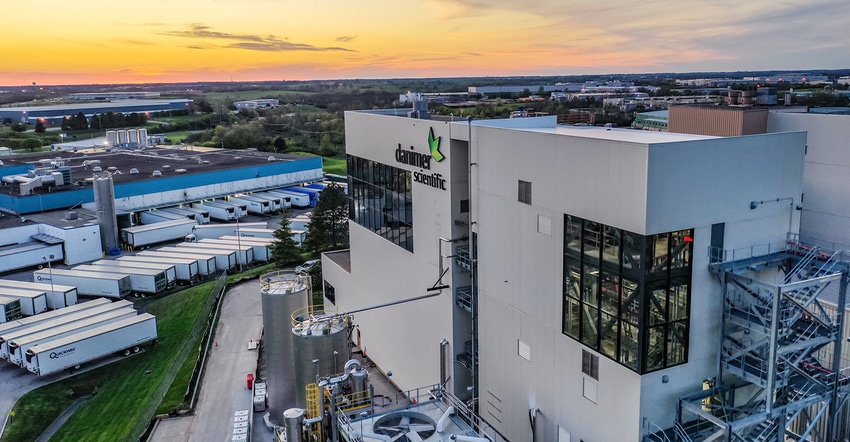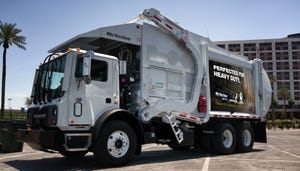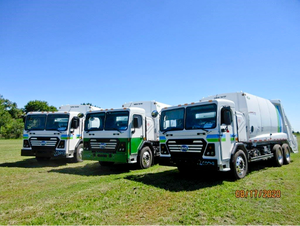Danimer CEO Croskrey Talks Bioplastics
Danimer Scientific is among tech companies entrenched in work to develop biopolymers that are biodegradable and compostable. Waste360 sat down with Danimer CEO Stephen Croskrey to discuss the company’s most recent activity, including its expanded partnership with Chevron Phillips Chemical (CPChem).

Danimer Scientific is among tech companies entrenched in work to develop biopolymers that are biodegradable and compostable.
Waste360 sat down with Danimer CEO Stephen Croskrey to discuss the company’s most recent activity, including its expanded partnership with Chevron Phillips Chemical (CPChem), who produces chemicals that go into more than 70,000 consumer and industrial products. Croskrey goes on to answer questions such as, what do we know about how much of the bioplastics in circulation are actually composted? And what’s happening at the federal and local government levels to take bioplastics further?
Waste360: Tell us about your partnership with CPChem.
Croskrey: Novomer, a company that Danimer acquired in 2021, first reached out to CPChem in 2020. Novomer was interested in using CPChem’s slurry loop technology for the production of PHAs (polyhydroxyalkanoates) and, post-acquisition, Danimer maintained and expanded the relationship.
CPChem is a globally recognized leader in slurry loop technology for polyolefins, and by working with their team, the technology could be adapted for the Rinnovo polymer, which is a PHA.
Waste 360: Can you explain the slurry loop reactor process? What are its benefits?
Croskrey: You can think of a slurry loop reactor as a way to continuously and more efficiently produce polymers. There are several major advantages of this technique. The first is product quality. Since the polymers are produced continuously, it reduces the risk of batch-to-batch variability. The second advantage is that the separation process is very efficient. A third advantage is cost efficiency, because the reactors can be operated continuously, without requiring significant labor expense.
Waste360: Describe the Rinnovo polymer and what makes it stand out.
Through the collaboration with CPChem the Rinnovo polymer will be used to explore the development and commercialization of cast extrusion films and blown extrusion films as well as injection molded parts and rotational molded parts.
Films are one of the most recognizable forms of plastics and are used in a wide variety of applications including grocery bags, snack bags, multilayer packaging, and agricultural films. The Rinnovo polymer is particularly well suited for film applications because of its exceptional barrier properties, elongation, and biodegradability. Films also happen to be a major contributor to plastic waste and microplastics as they are generally difficult to recycle and are lightweight, which leads to higher risk of leakage into the environment.
Rinnovo is, to our knowledge, the only PHA being commercialized that uses traditional chemical industry processing techniques. This significantly improves the cost efficiency and scalability of PHA production, which enables market access to customers who are more price sensitive.
Plus, while Rinnovo biodegrades similarly to the broader family of PHAs, it possesses unique thermal and barrier properties that make it particularly well suited to film applications currently served by polyethylene.
Waste360: How long does it take to break down in commercial compost settings?
Croskrey: Based on our testing, the degradation time for Rinnovo varies based on the environment. For example, it will degrade faster in soil than in marine environments.
Traditional petroleum-based plastics can take centuries to degrade, but Danimer’s PHA-based products can degrade in a matter of months under ideal conditions.
Waste360: Who are some of the converters and brands you work with?
Croskrey: The first product we commercialized from our signature polymer, Nodax, was resin for drinking straws. You can find straws made from our material at Starbucks, Dunkin’ Donuts, and many restaurants and entertainment venues around the world.
Our partner Wincup has a straw called phade that was featured at SoFi Stadium in California during last year’s Super Bowl. It’s also used at Yankee Stadium and Mercedes-Benz Stadium in Atlanta, among others.
In the dining area at Costco, you’ll find straws made by our partner Eagle Beverage. At Costco, you can also buy San Francisco Bay-brand coffee pods, made from our PLA-based packaging technology. And at Whole Foods and other supermarkets, our packaging is used for PepsiCo’s Off The Eaten Path brand.
Waste360: Are you trying to track how much bioplastic is going to compost facilities and actually getting composted?
Croskrey: Determining how much of a specific material gets composted would require tremendous resources. There might be opportunities to use barcode tracking on packaging to track where it ultimately gets disposed of, but I’m not aware of anyone utilizing technology like that currently.
Waste360: How is the federal government incentivizing the use of compostable bioplastics, and why does this matter?
Croskrey: In 2018, which is the most recent data available, the U.S. generated 292 million tons of municipal solid waste – that’s roughly five pounds per person per day – compared with 88 million tons in 1960. Waste generation has been increasing for decades, and government incentives can help accelerate the transition to making disposable materials biodegradable and compostable.
The Biden administration has shown that it’s committed to changing the status quo on traditional plastics. For example, Danimer is currently in the due diligence phase of a federal loan guarantee program with the U.S. Department of Energy that would finance the expansion of our Nodax polymer.
Earler this year, the Biden administration also announced a plan to replace 90% of fossil fuel-based plastics with biobased materials over the next two decades. And President Biden has issued an executive order launching a new initiative to help ensure that bioproducts invented in the U.S. can be manufactured here as well.
Waste360: What are some local governments doing to pump composting?
Croskrey: It’s vital for municipal and county governments to support composting programs. West Coast cities like San Francisco and Seattle have been diverting their food and yard waste away from landfills for decades. Other parts of the country have been slower to adopt composting initiatives, but recently there have been encouraging signs of progress. For example, in Jacksonville, Florida, the city is currently partnering with a local composting company on a pilot program to start collecting food and organic waste from certain restaurant locations.
Waste360: Are there any other recent milestones in this space, whether for Danimer or industrywide?
Croskrey: Danimer is listed on the New York Stock Exchange, and it was symbolically significant that this past April we were invited to ring the closing bell to mark the start of Earth Week.
The NYSE opportunity shone a spotlight not just on Danimer but on the larger bioplastics industry and the role it can play in creating a healthier environment for our future.
About the Author(s)
You May Also Like




